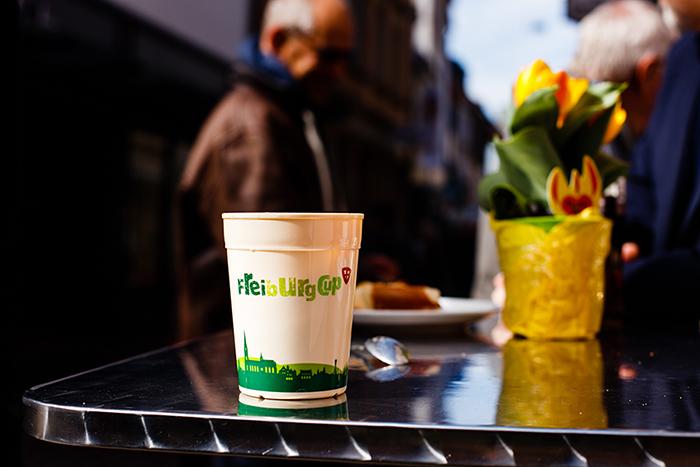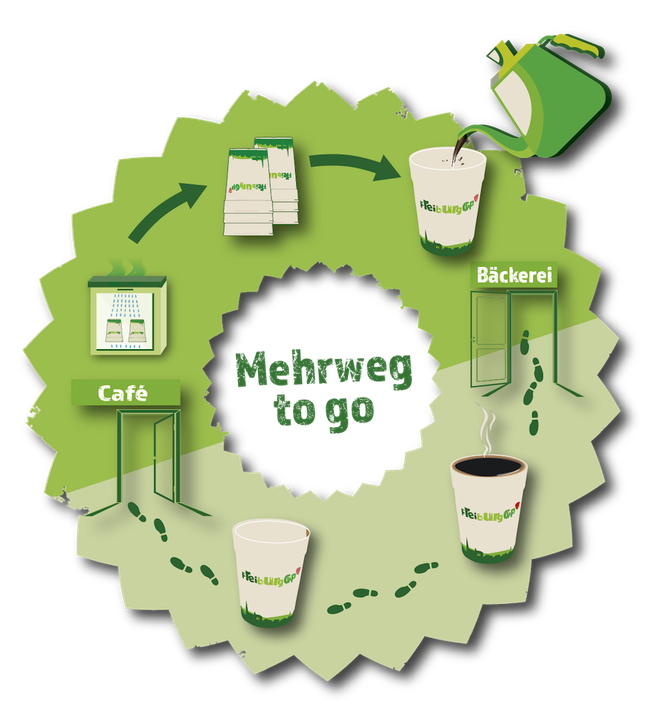This German City Has A Unique City-Wide Alternative To Disposable Cups
To combat the use of billions of disposable cups, a German city has created a reusable cup system that lets customers pay a €1 deposit for a plastic cup that can be returned to 100 participating businesses.
Updated May 26 2019, 8:38 p.m. ET
If you've been following green initiatives for a while now, you know the common enemy that is the disposable cup. Whether getting a coffee, smoothie, or fountain soda, paper, plastic and styrofoam disposable cups are everywhere. And after using them to drink your single beverage, they're thrown away only to slowly decompose and leach toxins into the environment.
There's an easy solution, of course: Just forgo the disposable cup in favor of a reusable one you carry with you. Well, that's easier said than done. Remembering to keep a cup on you is its own challenge; and sometimes you just need that midday caffeine pick-me-up, eco-friendly mug or not. So you guiltily use the paper cup, and throw it away.
Knowing this struggle is real, the German city of Freiburg took it upon itself last year to provide citizens with foolproof, reusable cup system. Rather than expecting residents to BYO cup (or buy a brand new one on the spot), Freiburg has created the Freiburg Cup, a reusable, plastic to-go cup with a disposable lid that customers can obtain with a €1 deposit and return to any one of the 100 participating businesses across the city for re-use.
Participating stores have an identifying green sticker in the window. When cups are returned, the stores disinfect them and make them available for more uses. Each can last about 400 rounds.
The program is particularly relevant to Germans, who consume roughly 300,000 cups of coffee every hour. That adds up to 2.8 billion coffee cups a year—each of which is used for an average of 13 minutes before being tossed out.
This isn't just a German problem, of course. In the U.S., it's estimated that we used 23 billion paper cups in 2010. On average, Americans also throw away 25 billion styrofoam coffee cups every year, and 2.5 million plastic beverage bottles every hour, both of which take longer than paper to decompose—if they do so at all: Most of the styrofoam disposed of today will still be present in landfills 500 years from now. And if you buy just one cup of coffee or tea in a disposable cup every day, you’ll end up creating about 23 pounds of waste in one year.
While cups clogging landfills is its own huge problem, the production of so many cups on the front end is also terrible for the environment. Each paper cup manufactured is responsible for 0.24 pounds of CO2 emissions, according to a study conducted by Starbucks and the Alliance for the Environmental Innovation. Meanwhile, each 16-ounce paper cup also requires 33 grams of wood, 4.1 grams of petroleum, 1.8 grams of chemicals, 650 BTU’s of energy, and almost a gallon of water to produce.
Plastic is even worse. Plastic cups generate about 28 percent more greenhouse gasses than paper cups and take up to 1 million years to decompose in a landfill. On top of that, the production of plastic cups is toxic, and the cups themselves can becomes a hazard by leaching toxins into the soil.
While the Freiburg Cup is plastic, it's made from polypropylene and does not contain BPA or plasticizers. Polypropylene is fairly heat resistant and considered "relatively safe," according to the book Life Without Plastic.
The Freiburg Cup system's first year was very successful. Other cities throughout Germany and the world have expressed interest in replicating the program. One problem has been the loss of about 15 percent of the cups, likely by the hands of tourists taking them home as souvenirs. Still, Environmental Commissioner Gerda Stuchlik says that is a small—albeit frustrating—price to pay.
"We take comfort in the fact that the idea of reducing waste is being exported to the world with every Freiburg Cup," she told Tree Hugger.


